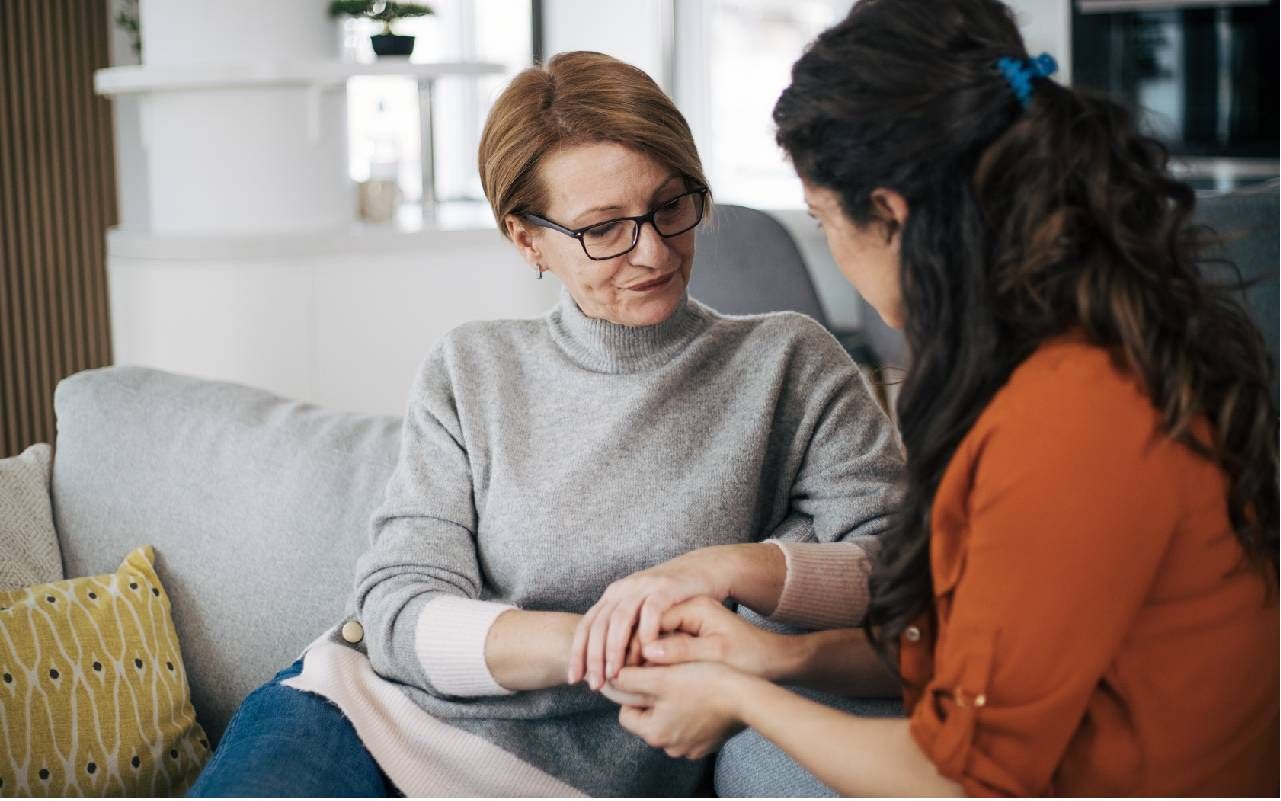A Parent's Journey: Supporting an Adult Child Battling Cancer
While the road is long, we remain positive and cherish each moment we have together as a family
My 35-year-old daughter Jessica texted, "Mom, I broke my arm." She had tripped up the stairs to tend to her 3-month-old baby. The nurse in me knew that a young woman doesn't easily sustain a fracture without a more significant reason, so I suspected an underlying issue. I immediately went to stay with her and her family since she could not use her arm and needed assistance with her three children.

Journey to Diagnosis
After a series of referrals, scans and, ultimately, a biopsy, Jessica received a diagnosis of osteosarcoma. Osteosarcoma is a rare and aggressive form of bone cancer most often seen in children and young adults. The CT scan noted there were also spots in her lungs, indicating she had metastases, meaning the cancer had spread to her lungs.
As humans, we always want a reason or an identified source of our pain, but I was not going to find one in this situation.
The path to diagnosis was agonizing for everyone involved. As both a parent and a nurse, each test that confirmed a cancerous diagnosis was like a hard blow to the gut. It seemed that each day brought us repeated waves of terrible news. As a person of faith, I was gutted and "angry at God" for some time.
Searching for Hope in Research
I couldn't comprehend how my previously healthy daughter had to face this journey. I came to realize that the cause of this type of cancer is not clearly understood by science, which only intensified my anger at the time. As humans, we always want a reason or an identified source of our pain, but I was not going to find one in this situation.
Even as a nurse, science did not give me a reason, and it deepened my pain as I read research studies that did not offer much hope. I had to stop reading the research. I needed to pivot from being a nurse first to being a mom who is a nurse.
Jessica endured several complications, including a thrombosis (a blood clot) in her affected arm and pneumothoraxes (lung collapse) in each lung. She was in the hospital for nearly three months, and at times, her condition was guarded.
Navigating the Complex Health Care System
While in the hospital, there were times Jessica was incoherent due to the side effects of the opioids she needed for pain control. Sometimes, physicians would visit her without a family member present and deliver information she could not recall accurately. We tried to have documentation to ensure the physician would contact the family, but this was not always possible.
Receiving home care or attending medical appointments often requires a second set of ears for digesting information and preventing miscommunication.
The nursing staff was often able to give the family an update, but because of staffing challenges, it wasn't always possible for them to be present during a physician visit. Navigating budget cuts and human resource shortages is challenging in today's health care landscape. While most of the staff on the inpatient oncology ward were knowledgeable, caring and well-informed, they sometimes had a patient assignment that exceeded their typical workload.
I only knew this from speaking with staff as a fellow "nurse," as they never made it evident to their patients that I was aware of. Advocacy is essential when your loved one is under medical care, whether in a hospital or home. Receiving home care or attending medical appointments often requires a second set of ears for digesting information and preventing miscommunication.
Whether documented via a hard copy notebook or on an electronic device, it is imperative to record updates and contact information for effective communication. Easy access to vital contact information for hospitals, physicians, cancer clinics, health care service providers and pharmacies will prevent stress and frustration during a crisis. Also, keep an updated list of medications for easy access.
It is also wise to keep a binder or folder for any paper correspondence for care or insurance for future reference. You can also scan these types of documents into your computer or cloud. When dealing with insurance companies, try to correspond with the same representative each time you make contact. Miscommunication can result in compensation delays.
The Emotional Toll of Being a Caregiver: Juggling Roles
"You aren't fun, Grandma, anymore," exclaimed my four-year-old grandson. That comment did not hurt my feelings, but it did serve as a gentle reminder of the shift in my role. Caring for grandchildren as the primary caregiver creates a new dynamic.
"You aren't fun, Grandma, anymore," exclaimed my four-year-old grandson.
Navigating the challenges of caring for and guiding children can be difficult when your child-rearing practices from thirty years ago may differ from today's norms. Ensure you know and respect their values and methods of raising children. Having an ongoing conversation with the parents is imperative to reduce conflict.
While you may care for the children while a spouse works or spends time with your hospitalized adult child, there may come a time when the family may need external support. You may need to introduce the possibility of additional caregiving resources, such as a nanny or babysitter.
Keeping up with cleaning and other household chores could prompt the consideration of a cleaning service. It may be an uncomfortable conversation to recommend help, but keeping the lines of communication open and carefully suggesting ideas will help preserve the relationship.
Seek Support
It was during our crisis that people would ask, "What can I do?" and I admit, it was challenging to come up with ideas. I was in survival mode. Friends and family want to help, and accepting offers are essential to preserving the caregiver's energy tank. However, it would be best if you were specific regarding what people can do. Some ideas you can suggest include:
- Making a meal, casserole or some baking
- Helping with childcare
- Respite care to give a break to the caregiver
- Picking up children after school
- Helping with transportation to medical appointments
- Running errands or grocery shopping
- Cleaning the house
- Donating financially to a "Go Fund Me" drive or other financial support
Your adult child's home care service may also have resources for enhanced caregiving. You may contact your child's home care manager for more information.
As a caregiver for your adult child, you must prioritize your health to remain strong enough for your caregiving role.
Self-Care
Taking care of yourself is not "selfish." As a caregiver for your adult child and their family, you must prioritize your health to remain strong enough for your caregiving role. Other factors may also present a challenge. I was 60 years old when this journey started and certainly did not have the same energy I did over 30 years ago when raising my family.
Ensuring you have time for self-care needs to be a priority. I realized my two days home on the weekend did not provide enough time to rejuvenate. I sought a weekly faith-based group to connect with others. Another family member graciously stepped in as a caregiver one day a week.
Ways you can provide self-care:
- Seek professional counseling from a therapist
- Practice relaxation techniques or breathing exercises
- Practice mindfulness or prayer
- Go for a walk in the woods, by a stream or other types of nature
- Journal your experiences and frustrations
- Keep a gratitude journal
- Book a massage, manicure/pedicure
- Take a bubble bath set with candles
- Keep connected with family and friends to reduce feelings of isolation and loneliness
This has been the most challenging road of my life as a parent.
Support Groups and Resources
Being a caregiver can be busy and rewarding, but it can be a lonely road at the same time. I had wonderful friends who would text me regularly and offer help and words of support, but sometimes, I needed to connect with people face-to-face.
I contacted a support group that has been helpful in many ways. If you are staying in a city where you don't live, like I was, you can seek caregiver support in several ways.
- Seek a support group or community group that can give you the much-needed time to recharge
- Seek a local church, synagogue, mosque or other faith-based communities to connect with clergy or inquire about small groups
- You can often seek guidance from your community center or seniors' group
- Find a grief support group if your adult child’s prognosis is poor
- The cancer center where your adult child receives treatment can also give you direction on support groups and connections to social workers in the program
Other caregiver resources have valuable information to offer. Some groups focus more on the adult child as a caregiver for a parent, but coping strategies may be similar. These include:
- The American Cancer Society has several resources to assist the caregiver in connecting with others going through similar journeys.
- Caregiver Action Network: CAN is the nation’s leading family caregiver organization.
- Help For Cancer Caregivers: Addressing the unique needs of caregivers of people with a cancer diagnosis.
- Family Caregiver Alliance: To improve the caregiver’s quality of life and those who receive care.
- The US Department of Health and Human Services also has a database of caregiver resources.
Recognize Your Efforts
It was difficult for me to give myself any credit. As a mother, I felt that caring for my daughter in this journey was my role. Even when I did accept assistance from others, I initially felt guilty. However, I learned to accept help, which improved my health and well-being.
Early in Jessica's journey, the phrase "It's the journey, not the destination" came to her mind and heart during a challenging day of appointments. Those divine words have given her peace and helped us all move forward day by day.
This has been the most challenging road of my life as a parent. I've watched my daughter experience hardships that no person ever should, but she has faced them with incredible strength, courage and a positive attitude.
I am so thankful for the improvement in Jessica's health since returning home from the hospital. She continues to respond to chemotherapy and has surgery in the near future. While the road is long, and the future may be somewhat uncertain, we remain hopeful and cherish each day, each hour and each moment we have together as a family.


